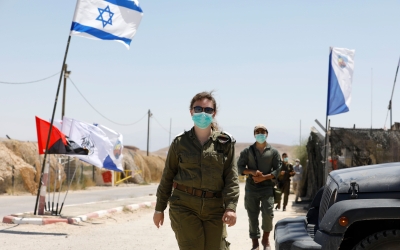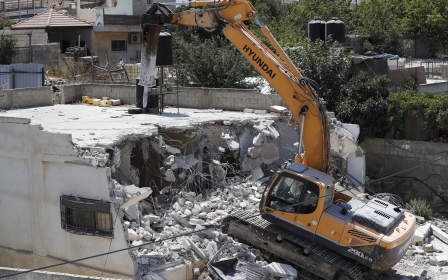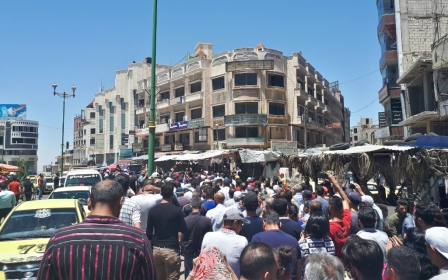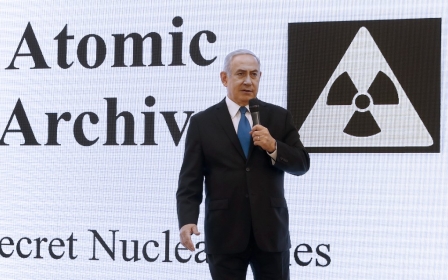'21st century apartheid': Israel's West Bank annexation plan denounced by UN experts

Almost 50 UN human rights experts have condemned Israel's plan to annex large parts of the occupied West Bank, calling it a vision of "21st Century apartheid."
In a joint statement released on Tuesday, the 47 independent experts said Israel's occupation of the West Bank had been the source of "profound human rights violations" against the Palestinians, chiefly the denial of the right of self-determination.
New MEE newsletter: Jerusalem Dispatch
Sign up to get the latest insights and analysis on Israel-Palestine, alongside Turkey Unpacked and other MEE newsletters
"These human rights violations would only intensify after annexation," the experts warned.
"What would be left of the West Bank would be a Palestinian Bantustan, islands of disconnected land completely surrounded by Israel and with no territorial connection to the outside world," they said, referring to the territories set out for blacks by South Africa's apartheid regime.
There was no immediate reaction from Prime Minister Benjamin Netanyahu's government, who has set 1 July as the date to begin advancing his plan to annex Israel's illegal settlements in the occupied West Bank, including parts of the Jordan Valley.
"Israel has recently promised that it will maintain permanent security control between the Mediterranean and the Jordan River," the experts said.
"Thus, the morning after annexation would be the crystallization of an already unjust reality: two peoples living in the same space, ruled by the same state, but with profoundly unequal rights. This is a vision of a 21st-century apartheid."
Israel's planned annexation of the Jordan Valley: Why it matters
+ Show - HideThe annexation of the Jordan Valley could effectively kill whatever hopes remain for a two-state solution to the Israel-Palestine conflict as it would render completely impossible the establishment of a viable, contiguous Palestinian state.
In April, Prime Minister Benjamin Netanyahu reached an agreement with his rival Benny Gantz to form a unity government that seek to impose Israeli sovereignty over the Jordan Valley. Legislature could be discussed from 1 July.
The Jordan Valley accounts for around one-third of the occupied West Bank (almost 2,400 square kilometres), where 30 Israeli agricultural settlements house around 11,000 settlers.
Some 56,000 Palestinians also reside in the Jordan Valley, including in the city of Jericho, where their daily lives are deeply impacted by Israeli occupation policies.
The area is rich in minerals and agricultural soil and is a highly strategic area, as it lies along the Jordanian border.
Jordan, the Palestinian Authority in Ramallah, and senior officials in the European Union openly oppose the annexation plan, while the administration of US President Donald Trump has encouraged such moves.
The Times of Israel reported last week that three large illegal settlements – Maale Adumim in occupied East Jerusalem, Ariel in the north of the West Bank and Gush Etzion near the cities of Bethlehem and Hebron, would be annexed on 1 July, with the Jordan Valley to be annexed in September.
Israeli officials told the newspaper that this "limited annexation" would be accepted by Netanyahu's coalition partner, Benny Gantz, as well as settler leaders who have expressed opposition to US President Donald Trump's plan, which envisions a Palestinian political entity on 70 percent of the West Bank not to be annexed by Israel.
In January, Trump unveiled his controversial Israel-Palestine plan which proposed Israel to claim about one-third of the West Bank in exchange for the recognition of a disjointed Palestinian state with no control over its borders or airspace.
The Palestinians have rejected the proposal and voiced outrage at Israel's proposed annexation.
The experts voiced "great regret" about Washington's role in "supporting and encouraging Israel's unlawful plans," saying the United States should be "ardently opposing" an imminent breach of international law "rather than actively abetting its violation."
Palestinian negotiator Saeb Erekat welcomed the statement from the UN experts, saying that it serves as "a reminder for the international community of its responsibilities, of the gravity of the situation and of the urgency to implement accountability measures to end the illegal colonial-settlement enterprise".
To date, more than 600,000 Israeli settlers live in sprawling settlements and outposts in Israeli-controlled Area C, often in confrontational proximity to the three million Palestinians living in the West Bank and East Jerusalem.
Middle East Eye delivers independent and unrivalled coverage and analysis of the Middle East, North Africa and beyond. To learn more about republishing this content and the associated fees, please fill out this form. More about MEE can be found here.






